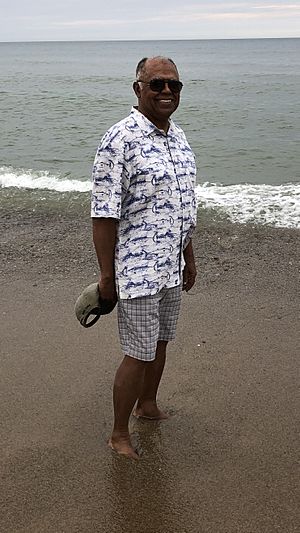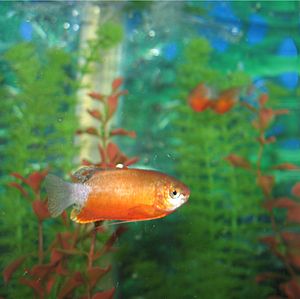Ambrose Jearld Jr. facts for kids
Quick facts for kids
Ambrose Jearld Jr.
|
|
|---|---|
 |
|
| Born | |
| Alma mater | University of Maryland Eastern Shore (B.S., 1965) Oklahoma State (M.S., 1970; Ph.D., 1975) |
| Awards | Fellow of American Fisheries Society Annual Ambrose Jearld Jr. lectureship at Woods Hole Diversity Initiative |
| Scientific career | |
| Fields | Marine Biology |
| Thesis | Ethological Study of the Honey Gourami, Colisa Chuna, and Its Congeners (1975) |
| Academic advisors | Rudy Miller |
Ambrose Jearld Jr. is a famous marine biologist. He was one of the first Black fisheries biologists at the National Oceanic and Atmospheric Administration (NOAA). He worked for almost 40 years at the Northeast Fisheries Science Center (NEFSC) in Woods Hole, Massachusetts. A special series of talks in Woods Hole is named after him. This shows how much he worked to bring more different kinds of people into science.
Contents
Early Life and Education
Ambrose Jearld Jr. grew up on a family farm. This was in Orrum, North Carolina. He became interested in science when he was in high school.
In 1965, Jearld earned a bachelor's degree. He studied Biology and Chemistry. He got this degree from what is now the University of Maryland Eastern Shore. After college, he worked as a chemist for a few years.

In 1967, he started a fully-funded master's program. This was at Oklahoma State University–Stillwater. In 1969, he joined the army during the Vietnam War. He worked at a Medical Research Laboratory in Maryland. There, he could do biological research. During this time, he also worked on his master's research. He studied Channel catfish. He earned his master's degree in 1970.
After his military service in 1971, Jearld decided to get his PhD. He returned to Oklahoma State University–Stillwater. He worked with his advisor, Rudy Miller. His research was about the Honey gourami. He earned his PhD in 1975.
Career and Research
After getting his PhD, Jearld became a professor. He taught biology at Lincoln University (Pennsylvania) from 1975 to 1977. Then, he became a professor at Howard University. During these years, he also did short research projects. For example, he studied anchovy in San Francisco Bay.
In the summer of 1977, Jearld did research on marine animals. This was at the Sandy Hook Laboratory in New Jersey. In 1978, he worked part-time at the Woods Hole Laboratory. That summer, he got a full-time research job. This job was in Falmouth, Massachusetts.
Jearld worked at the NOAA Northeast Fisheries Science Center (NEFSC). He started in 1978 and retired in 2016. When he was hired, he was the first Black researcher with a doctorate at NEFSC.
He joined a team that gathered information about fish populations. This helped them understand how many fish were in the ocean. They collected data on things like fish age. This created a very important dataset for many fish and shellfish. Jearld helped with studies on how to figure out a fish's age. He also wrote a chapter on "Age Determination" in a book called Fishery Techniques. This book is very important for scientists who study fish.
In 1985, Jearld became a section chief. He led the Research Planning and Evaluation Section. In 1997, he became chief of Research Planning and Coordination. In 2004, he became the Director of Academic Programs. He retired from this position in 2016.
As a biologist and leader, Jearld helped NOAA with international work. He worked with South Africa on fisheries. He helped them create a plan for their fishing industry. He also helped with human resources and working with universities. He also helped six West African countries. These countries are around the Gulf of Guinea.
Promoting Diversity in Science
Jearld was the first leader of the Woods Hole Diversity Advisory Committee. This group started in 2004. It brings together six science groups. Their goal is to make science more welcoming to everyone. This includes the NOAA Northeast Fisheries Science Center and the Marine Biological Laboratory.
Ambrose Jearld Jr. also helped start the Partnership Education Program (PEP). He was its director from 2009 until he retired in 2016. PEP helps college students from different backgrounds. It encourages them to study marine and environmental sciences.
In 2017, the Woods Hole science community started a special event. It's an annual lectureship named after him. This honors his work to make ocean science more diverse.
Honors and Recognition
- 2021 American Geophysical Union Ambassador Awardee
- One of the first American Fisheries Society Fellows in 2015
- Member of the Leadership Council of the American Geophysical Union
- 2004 Member of the Sea Education Association Board of Trustees
- 2007 Member of the Massachusetts Maritime Academy Board of Trustees
- 2017 The Woods Hole Diversity Initiative started the annual Ambrose Jearld Jr. lectureship. This honors Jearld's work to improve diversity in ocean sciences.

